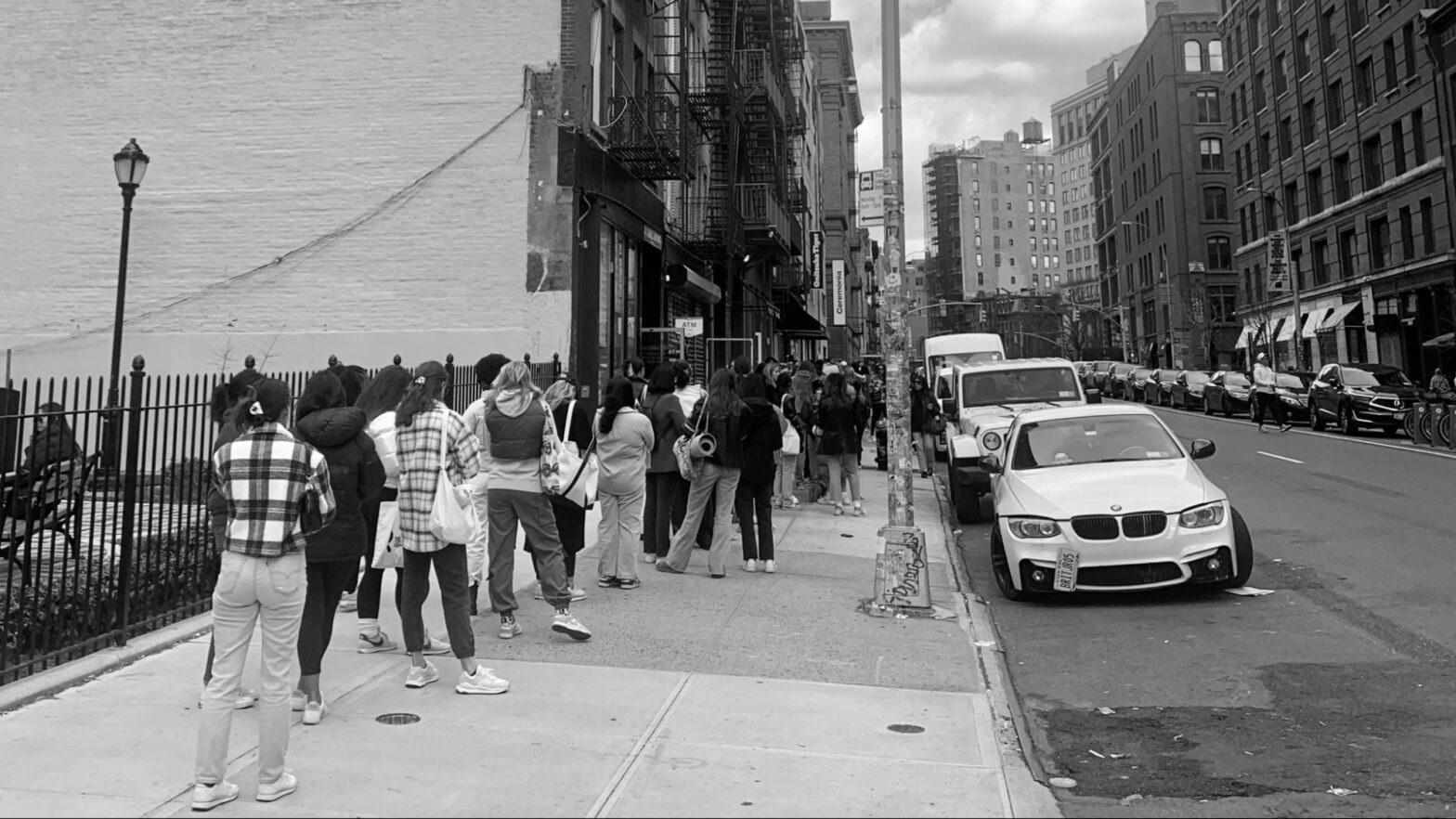Detoure, a Los Angeles-based thrift store, hosted a one-day pop-up sale in NYC on March 5th where customers could shop the closets of their favorite influencers. However, dozens of shoppers left empty-handed, saying that the social media shopping experience was an ethically questionable mess.
The event, which attracted over 500 shoppers, was described by attendees and those online as overcrowded, disorganized, and unethical. One shopper, 23-year-old Kayla Barnes, called the event “a crazy 10-minute sale from hell.”
According to those who went, Detoure turned away customers and sold poor quality fast fashion pieces for mark-ups. Their lack of transparency has customers questioning whether or not they are in compliance with federal consumer protection rules. The company massively underestimated the amount of attendees, with lines extending from Lafayette to Grand Street and three blocks up Crosby Street. Many of those who managed to enter the store, said they left unsatisfied with the selection and pricing of inventory.
Between their discontent of being asked to leave, Detoure’s faulty SMS system (that didn’t deliver the event’s address notification for those who subscribed), and the reportedly excessive pricing, dozens turned to the internet to express their complaints — sparking a discussion of the company’s ethics as a whole.
TikTok user @emilypolner expressed her disappointment in a nearly five-minute video titled “Detoure Disaster,” which featured footage of Detoure staff apologizing and asking those in line to leave. The video, which attracted 25K views, has over 120 comments many of which echoe grievances with the event and its merchandise.
The top commenter, username @_spiit, claimed they “saw tops with Shein tags cut out for $30.” Detoure replied to the comment, stating their staff “didn’t know the item was Shein if it was priced $30.” They also assured that their pricing should always be 50% off original retail value.
In a separate TikTok video, Barnes described her experience at the NYC pop-up with similar frustrations. Barnes was unhappy with the lack of organization and low quality offerings for unaffordable prices, considering they advertised mid-tier brands like Revolve and Alo Yoga being “brand new at prices like $10, $15, and $20.”
Those online were also concerned that Detoure’s merchandise could be items gifted to influencers by other companies’ PR teams. This would mean they are profiting off of free gifts, prohibited by the Federal Trade Commision (FTC).
“It’s against FTC to sell clothes or things you were gifted for free from brands,” commented 23 year old Susie Mckeon, who feels “icky” about influencers profiting off clothes they likely received for free. Another TikTok user with 83.5K followers, @vivecachow, chimed in by saying, “I just give my PR away to my followers.”
“America’s first influencer thrift store,” Detoure was founded in 2021 by Meghan Russell. The 25-year-old CEO who previously worked in sustainable fashion marketing came up with the idea after talking to an overwhelmed influencer whose closet was overflowing and didn’t want to throw away her excess clothes. She says she saw an opportunity to create a service that would allow people to shop influencers’ closets second hand. The online website even allows shoppers to filter by influencer. The business runs through influencers, who send their unwanted used clothes to be sold by Detoure, and in return receive a significant portion of the proceeds of its sale price.
Russell told The New School Free Press that Detoure takes a percentage from each sale, but the exact details were confidential. According to Detoure’s Influencer Program (which has since been unlinked from their website), after an item sells (either online or at a pop-up event) the respective influencer earns 90% of the sale deposited to their PayPal account.
Detoure does not currently have a screening process in place to ensure that items being sent in by their influencers were not initially gifted or promotional material. Rachel Porter, a 29-year-old content creator and one of Detoure’s first influencer clients, recalls giving Detoure gifted items.
“I think for the most part, most of the influencers do give [Detoure] stuff that they were gifted,” Porter told the Free Press. She emphasized that with the amount of gifted clothing influencers receive everyday, “they just can’t keep it all.” Porter now sells most of her items through Poshmark.
While Russell acknowledges those concerns with Detoure’s business practices, for now, she believes that the importance of Detoure lies in their sustainable practices, she said. According to Russell many brands have shown their appreciation towards Detoure’s mission.
“I think what we offer is just helping them be sustainable and give each item a lifecycle that doesn’t end up in the landfill,” Russell said. She added that she is focusing on establishing partnerships with brands to help sell their overstock.
Russell asserts that at its core, Detoure is a small business trying to tackle a large issue: fast-fashion overconsumption. “It is a societal issue that fashion moves this quickly,” said Russell.
Although McKeon did not attend the event, she followed the online discourse closely and told The New School Free Press that she believes allowing a clothing item to get a second life “is a net positive no matter where it comes from,” but firmly believes that the idolization of influencers is objectionable.
Mckeon stated, “[Detoure is] putting influencers on this weird pedestal that they are already on and are like, ‘oh, you get to receive such and such influencer’s used shoes!’” Even with overconsumption being so normalized on social media, she added that “transparency within the influencer industry is extremely important,” whether that be receiving or selling their gifted items.







